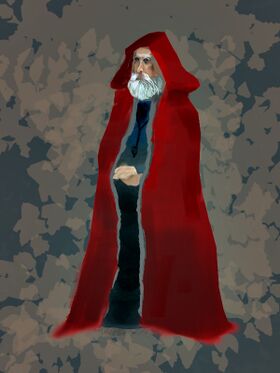Rufu Aoa
Rufu Aoa /'rʊfʊ æ'oʊɑ/ was the founding king of Afanyu who abruptly lost control of his kingdom due to a wave of separatism. He remained the ruler of a large portion of his country, specifically the southern provinces, which would later become the Upper Kingdom. He was killed in battle by Drufos Lador in 1674 SR.
| Rufu Aoa | |
| The Utbringer | |
| Superhero warrior | |
|---|---|
| Powers | Legendary |
| Ruler | |
| Title | King of Afanyu King of Gled |
| Reign | 1650-1674 SR |
| Successor | Baloe Damis |
| Personal details | |
| Born | c. 16th CSR |
| Died | 1674 SR |
Rufu Aoa was suspected to be a legendary, with his life traced back to as early as the end of 15th CSR, although he himself never suggested this to be the case. Known under the name of Rufule, he was an important figure in Barzo, but then vanished from the city. He was later known as the Utbringer and played an unclear role in Darda, eventually venturing farther east to what would later become Afanyu, where he quickly gained power.
Early life
Having become the king of Afanyu, Rufu Aoa had his official biography written, but it was vague and largely metaphorical. Later research revealed him to be a major player in Duls Settlements at least a century earlier. There are also indications that he crossed Ouna from Central Dantria and that he was originally from the suburbs of Gun Den. The latter fact was claimed by several people who knew him in Barzo, one of them Dilly the Dusty Fiend.
As Rufule in Barzo
In Barzo, Rufu Aoa is known as Rufule and serves as a member of Officers of the Blue Star, a law enforcement agency. He is the Chief Assistant to Master Officer, which makes him second-in-command. Between 1505 and 1512 SR Rufule takes active part in the organization and its war against bandit gangs. At the same time, he personally knows many of the bandits and is said to be close to Greental Davor of the Peliner gang. In spite of that, all members of the Peliner gang are killed in 1510, when Officers managed to surround their camp and then push them off the cliff into the Rener river to their deaths. Rufule, however, is not present at the encounter.
Two years later, Rufule leaves Barzo. His position of Chief Assistant remains vacant, with the Master Officer leaving specific instructions to his successor to keep it vacant unless Rufule comes back to claim it.
It is speculated that Rufule left Barzo due to the Great Turtle war, as it began shortly thereafter: there are no records that describe his time during the conflict, but strong indirect evidence strongly suggests that he was a participant.
As the Utbringer in Darda
Main article: Uprising in Basistar
Next time Rufule resurfaces in Darda and becomes one of the leaders of the uprising against Basistar's pro-Dardian government. Based in the city of Mustief, the movement grows quickly and captures the region's attention. Rufule becomes known as the Utbringer and his red cloak makes red the symbol of the movement. Mustief's governor flees the city, forcing Basistar's government to react.
The Utbringer's role in the whole affair, however, is unclear. When the representatives of Darda tried to approach him, they were instead put in front of Molag Uusea, who turned out to be the actual leader and representative of the movement. Further research confirmed that the Utbringer was not a participant in any of the key events of the uprising, which makes it unclear why his name became so widely known and connected with the affair. Some in the movement believed that the Utbringer was a prophet, but if he had offered prophecies, no records have been found as to what they were.
Either way, by the time Molag overtook Mustief, the Utbringer had already left the region and was never seen in Darda again.
As Rufu Aoa, king of Afanyu
Rufu Aoa emerges in the city of Gled in 1650 SR and assumes power. He surrounds himself by a group of high ranking military officials, who are the representatives of the region's city states, and unites them under a single rule. He is, however, rarely seen and his whereabouts are frequently unclear even to his inner circle. It is thought that most of the operational decision making was done by his generals, although he provided at least some direction.
